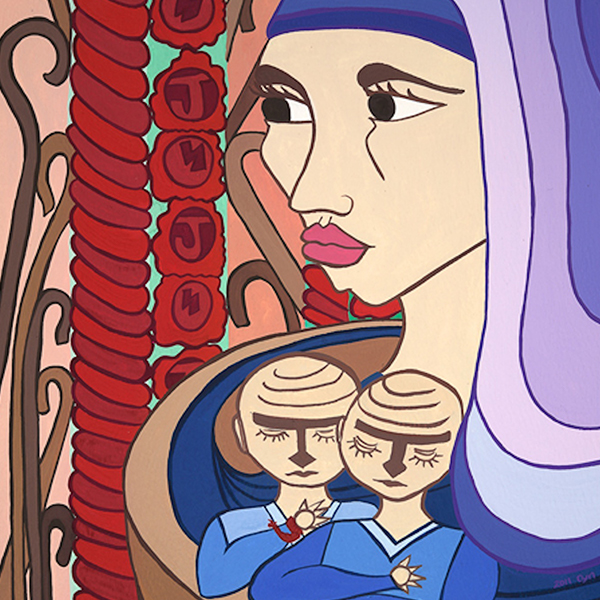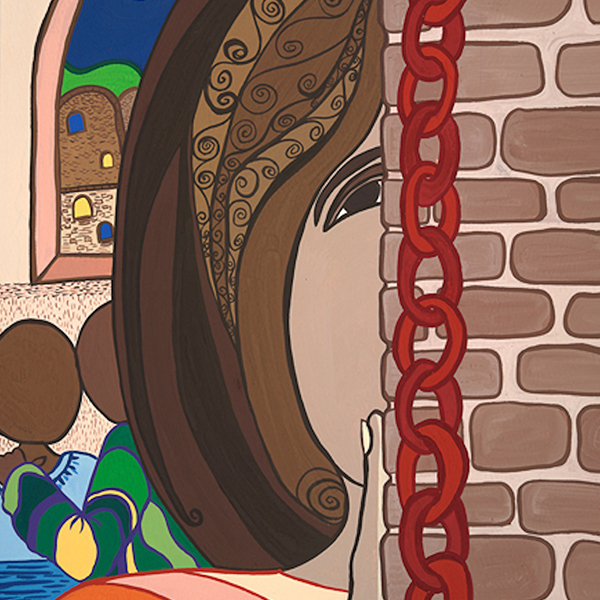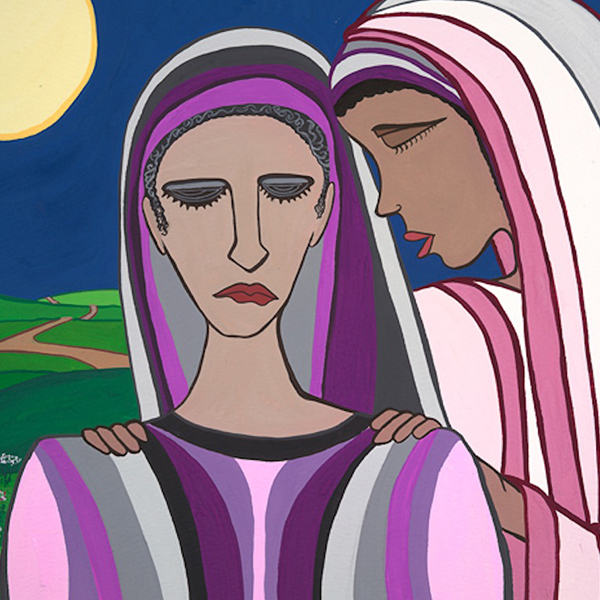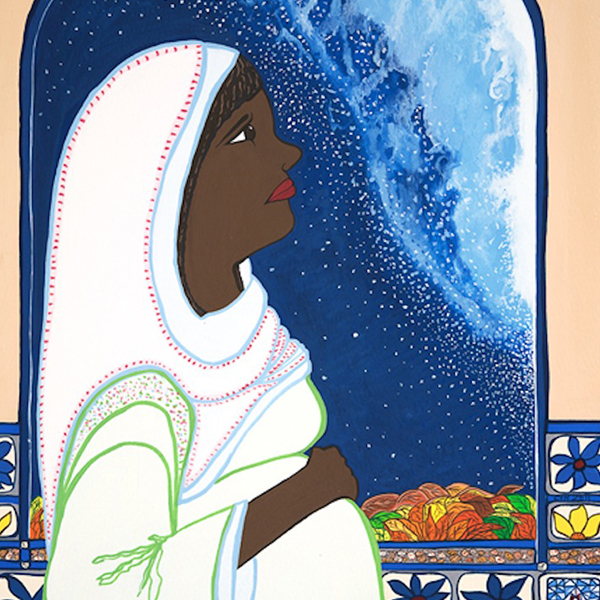"Beloved of the Lord" and "A Gift from God"
 Mathew calls the first three out-of-place-ornaments on Jesus’ family tree by name: Tamar, Rahab, and Ruth. The fourth, Bathsheba, he doesn’t refer to by name but alludes to her and how she came to be included in this broken tree when he says, “And Jesse begat David the king; and David the king begat Solomon of her that had been the wife of Urias.” (Matthew 1:6) Bathsheba was the wife of Urias.
Mathew calls the first three out-of-place-ornaments on Jesus’ family tree by name: Tamar, Rahab, and Ruth. The fourth, Bathsheba, he doesn’t refer to by name but alludes to her and how she came to be included in this broken tree when he says, “And Jesse begat David the king; and David the king begat Solomon of her that had been the wife of Urias.” (Matthew 1:6) Bathsheba was the wife of Urias.
Who is this Urias, more commonly known as Uriah the Hittite? And why has his story been alluded to in Bathsheba and King David’s inclusion in Jesus’ family tree?
Those are two of the questions that will be answered as we travel back to Jerusalem in King David’s time to examine Bathsheba’s story as it is recorded in 2 Samuel 11-12.
How did she get here?
Nine months before, she had it all. She had a loving and dutiful husband, a man who served his God, his king, and his country with unending faithfulness. But now that man was DEAD, and here she was holding in her arms a dead son. How did she get here?
Her story begins with King David. Most of the time, when people examine David and Bathsheba’s story, much, if not all, of the focus is on David. Until I set out to explore the five out-of-place ornaments on Jesus’ family tree, David was always the attention of my study of their affair and its aftermath. I never really spent too much time thinking about the damage this would have done to Bathsheba’s heart and soul. I never really stopped to consider her involvement. Did she just get pulled into all of this as an unwilling participant? Or was she complicit in the affair?
Bathsheba was the daughter of one of David’s 30 Mighty Men; her grandfather was one of David’s most trusted advisors, her husband, Uriah the Hittite, was one of David’s military leaders. Had Bathsheba and David ever met before that fateful night? Because of all of those close connections, it almost seems like a given that they would have at least crossed paths, and surely David knew who his neighbors were.
Summoned by the King
On that night in question, Bathsheba was innocently taking a late-night bath in her backyard. David was walking on his rooftop veranda. The Bible tells us that he shouldn’t have been there, not just on the rooftop or in the palace, but not even in Jerusalem. David should have been off at the battlefront. It was the time of year when kings went to war, but David had chosen to stay home. And even before he starts to lust after his bathing neighbor, David’s getting up from his bed to pace on the rooftop indicates that all was not well with him.
David saw the bare-skinned beautiful woman bathing and had to have her, like an object to be possessed. He sent someone to find out about her and learned that she was Bathsheba, the daughter of Eliam and the wife of Uriah the Hittite. Even if he did not personally know her, David must have known about her; he was friends with her husband, father, and grandfather. Nonetheless, David sent his men to get her. She went to him, and they slept together. Bathsheba became a victim of David’s sin, and because of David, she became an adulterer.
What the King Wants the King Gets
Can you imagine what it must have been like for Bathsheba to have those strange men suddenly appear while she was bathing, late at night? What were the first thoughts that went through her mind when she learned that the king wanted to see her? “Is there news about Uriah? Is he captured? Is he DEAD? Is that why David wants to see me at this hour?” Or would her woman’s intuition have told her immediately what David was after and that SHE was why he summoned her?
What did she think, and what did she do when she arrived in the presence of her sovereign? What did David do or say to convince her to sleep with him? How did he convince her that this was permissible and even proper? This man who summoned her was the king, God’s ruler on earth. David was one of the most influential political leaders globally and a seasoned soldier and tactician on top of that. Could she resist him even if she wanted to? Her mind must have raced.
What to Do When the King Wants You
“What does this mean? What if I say yes? Can I be unfaithful to my husband in this way? What if people find out about this? David’s men will surely know, will they keep his secret? But what happens if I say no? David is the king. He is a powerful man. What might he do to me? To Uriah? My family?”
We don’t know what went through her mind or if she hesitated. The Bible doesn’t tell us. It merely says, “David slept with Bathsheba, then she went back home.”
A few weeks later, Bathsheba was the one who sent a message to David, “I am pregnant.” Her one night with the king was not only just one night, now a part of him was growing inside of her. She must have hoped to forget that night and somehow hide away the guilt, but now that was going to be impossible. Her growing belly would be a constant reminder of her shared sin, her adultery.
The King’s Cover-Up
We don’t know what David’s initial reaction was, but we know his quick response. “I have to cover this up. No one else can find out about this. Too many already know. If this becomes public knowledge, there will be a scandal. What will this mean for me? For my family? For the kingdom?”
David’s wheels start to turn. He begins plotting and planning. David thinks, “If I can get Bathsheba’s husband Uriah to come home, he will sleep with her, and then she can wait a few weeks to announce the pregnancy. The baby will come a bit early and be a bit large, but no one will be the wiser.” There were no DNA tests back then, and Uriah was a trusting man.
David called Uriah home from the front lines and welcomed the loyal soldier into the palace courts. David first inquired about the war’s progress and how the soldiers were doing, then he told him to go home. Uriah left, but he didn’t go home; instead, he slept at the palace entrance with David’s servants.
The Cover-Up Fails
David’s scheme didn’t go at all according to plan. He summoned Uriah again and asked him why he didn’t go home. Uriah explained to David that he couldn’t even think about going home to sleep with his wife when his men were out in the field preparing for battle. Uriah’s faithfulness to king, country, and comrade made David’s unfaithfulness look even worse than before. David tried to get Uriah drunk, but even then, he wouldn’t go home. He once again, as a dedicated servant to David, slept outside with his servants. That’s the kind of man Bathsheba cheated on. A man who was faithful, honest, and true.
David’s plan came fully unraveled. He had provided Uriah with the opportunity to help him make things right, and he hadn’t taken it. David spiraled further down the path of deceit. He sent Uriah back to the battle lines with a sealed letter to his general, Joab, which instructed him to place Uriah at the front of an attack and then pull back from him and leave him to die. Uriah carried the orders for his death to his general, and Joab carried out David’s orders flawlessly. Joab sent word to David of the next day’s battle and included in it a side note that Uriah the Hittite had fallen.
God Seeks Out His Lost Son and Daughter
How did Bathsheba deal with all of this? She had to be aware of some of this. Her husband, one of David’s mighty men falling in battle, at this time, couldn’t be just a convenient coincidence. How much she knew, again, we don’t know. But we know this, she spent time mourning Uriah’s death, but then David took her into his home as his wife.
Was David convinced that they had gotten away with adultery and murder? He might have gotten away with it, but he couldn’t get away from it. Even though the people didn’t know, God knew. And he knew that David was not in the right place. David was lost. Sin was pulling him further and further from God.
But God didn’t leave David or Bathsheba to their own deceit or devices. God sent the Prophet Nathan to confront David and call him to repentance. When Nathan arrived at the palace, he didn’t hesitate to confront David and his sin. He told David a story about a farmer who had but one little lamb unjustly taken from him by one who had many. David condemned the one who had stolen the lamb, and Nathan said to David, “You are the man.”
Nathan then explained to David some of the consequences of his actions and how his sin would infect his whole household. David saw his selfishness and his sin for what they were and confessed, “I have sinned against the LORD.” And Nathan responded, “The Lord has forgiven your sin. You are not going to die, BUT the son that was born to Bathsheba, he will die.”
Praying and Pleading
When Nathan left, the child that had been born to David and Bathsheba became very sick. David pleaded and prayed to the LORD to spare his son. He fasted and both days and nights, he spent dressed in sackcloth laying on the ground. Guilt and remorse overwhelmed him. Oh, how this would hurt Bathsheba. David was already responsible for the death of her husband, now her son. Then finally, on the seventh day, the child died.
But He Died
The Bible tells us how David responded. As soon as he got word, David got up from the ground, cleaned himself up, ate, AND worshiped God. That’s what David did, but what about Bathsheba? What was she doing and feeling all this time? She, too, was surely consumed by guilt. Her husband and son’s death, brought about by her adultery, wrecking her heart and soul. Can you imagine that?
One night with the king had started sin and consequences spinning out of control. The man who loved her so faithfully was dead because of her. The baby in her arms, dead because of her. Maybe she tried to rationalize it in her mind, saying, “It’s not really my fault, I was pulled, forced into this sin and situation. It was peer pressure of the worst sort.” Again, we don’t know how she felt. But we, who have sinned willingly or been pulled into sins similar or strikingly different, don’t have to try hard to relate.
God Gives a New Name
Thankfully, we don’t have to imagine or guess what happened next.
And David comforted Bathsheba his wife, and went in unto her, and lay with her: and she bare a son, and he called his name Solomon: and the Lord loved him.
And he sent by the hand of Nathan the prophet; and he called his name Jedidiah, because of the Lord.
2 Samuel 12:24-25
The end of their story, which began with their affair, is filled with God’s goodness and grace. God opened up Bathsheba’s womb again, she bore another son, and she and David gave him the name Solomon, which means “Peace.”
Perhaps they gave him that name because the country was then at peace after many years of conflict. More than that, though, it must have been something even more significant. When they looked at that child, they had peace with themselves and peace with God after all they had been through. This child gave them new hope and new life.
But God took his forgiveness one step further. He wasn’t content for them to merely have peace; he wanted them to know that they were loved, loved by him. And that is why he sent Nathan back to them to say, “Your son’s name shall be Jedidiah. Beloved of the LORD.”
I Love You
In that baby, and in the name he gave him, God was saying loud and clear for all the world to hear, “I love you. I love you. I LOVE YOU.” As Bathsheba held baby Solomon, she had peace from God, which passes all understanding. Each time she smiled at or was smiled at by her baby, she was reminded of the name God gave him, Jedidiah, her Beloved of the LORD. She knew something; she knew that God is a God of love. Because of that love shown to her in her baby, her guilt could be gone, her wreckage redeemed. Jedidiah was God’s big “I Love You” gift to them both, but God’s gift of blessing through babies wasn’t over yet.
Branches on the Tree
To learn about this next baby and the gift he was, we have to go back to Jesus’ lineage of grace. In this series, we have been looking at Jesus’ lineage as Matthew records it. It is the family line of Joseph, the adoptive, earthy, non biological father of Jesus. But something interesting happens. In the New Testament, there is another lineage recorded by Luke. Unlike Matthew, Luke traces the origin of Jesus’ mother, his biological earthly mother, Mary, whose story is examined in the next post. Although the trees are very similar, there is a place where they branch off, and that place is right here with David and Bathsheba and their sons.
As it turns out here, although Matthew includes Solomon in Jesus’ family tree, Luke does not. Luke 3:31 says, “Which was the son of Melea, which was the son of Menan, which was the son of Mattatha, which was the son of Nathan, which was the son of David.” (Luke’s genealogy is a recording of Mary’s lineage while Matthew is a recording of Joseph’s lineage.)
1 Chronicles 3:5 includes a list of all of David’s sons born to Bathsheba. And second on that list after Solomon, you guessed it, Nathan.
How Could They Name Him, Nathan?
NATHAN??? Of all of the names in the world that David and Bathsheba could have chosen for their son, they named him NATHAN? Why might they do that?
Solomon means PEACE. Jedidiah means BELOVED OF THE LORD. Nathan means GIFT OF GOD.
In the Bible, names have great significance; this one is no exception. Nathan is oozing with God’s goodness again. For David and Bathsheba to name their son after the man who came and pointed the finger at David and said, “You are the man,” that means that they got it. They got it all.
No doubt, David and Bathsheba eventually recognized that the day that Nathan showed up with his rebuke was the best day of their lives. Even though it probably seemed like the worst day ever, they came to see that day as a lavish gift from their loving God.
They came to view Nathan, the one that had shown them their sin, not as an enemy, but a dear and trusted friend, an extravagant gift from God. That baby, who would be in the line of the Savior, they named after their dear friend Nathan, their gift from God.
God Loves to Give
Bathsheba’s story culminates hundreds of years later with one more baby, and one more name, another gift of God. A truer and better gift than Nathan. And an even better redeemer than Boaz, his name Jesus who would save his people from their sins. He was an even better, more perfect gift of God. God so loved to give to David and Bathsheba.
God gave them the Prophet Nathan to show them their sin.
God gave them Solomon to show them peace.
God renamed him Jedidiah to show them his love.
God gave them Jesus to show them himself.
God so loves to give to you too.
God’s Gifts to You
I don’t know where you are at right now. I don’t know from where your guilt stems. I don’t know what sins you have given into fully compliant or into what sins you were pulled. I don’t know if you have rejected all of God’s substantial gifts to you, choosing self and sin over him. But whatever that guilt is, and wherever it comes from, let those babies in Tamar, Rahab, Ruth, Bathsheba, and most importantly, Mary’s arms remind you, like Jedidiah, that you are beloved of the Lord.
How does he show you that love?
First, God says to you today, as he did through the Prophet Nathan of old, “You are the man or the woman. You are the one who has broken God’s commandments. You are the one who deserves sin's consequence of death and punishment in hell. You are the one who has tried to cover up your sins with your foolish plans.”
Second, as you confess your sins like David did, saying, “I have sinned against the LORD,” hear his words to you from Nathan and Jesus, “The LORD has taken away your sin. You are at peace with God. You are his beloved. You have forgiveness through the life, death, and resurrection of his son Jesus.”
Those are just a few of God’s gifts to you. Hold them close like a precious newborn child, a child a King that was born for you.
Questions to Consider
- What does Bathsheba's story lead me to confess about myself and my story?
- What does Bathsheba's story teach me about Jesus and my part in his story?
- What does Bathsheba's story and her place in his story lead me to pray about this week?
More Stories from Jesus' Family Tree
Are you anxious?
Free 4-Lesson Scripture Study
We are all carrying something. Weariness from the treadmill of life, isolation and loneliness from feeling like we don’t belong, anxiety over what might happen to us and those we love in the end, bitterness from failing to forgive, or tension from having forgiveness withheld from us.
Our FREE, Handbook for Healing scripture study identifies your pain, shares the cure and provides a treatment plan for living a life of freedom, forgiveness and peace can look like for you.




